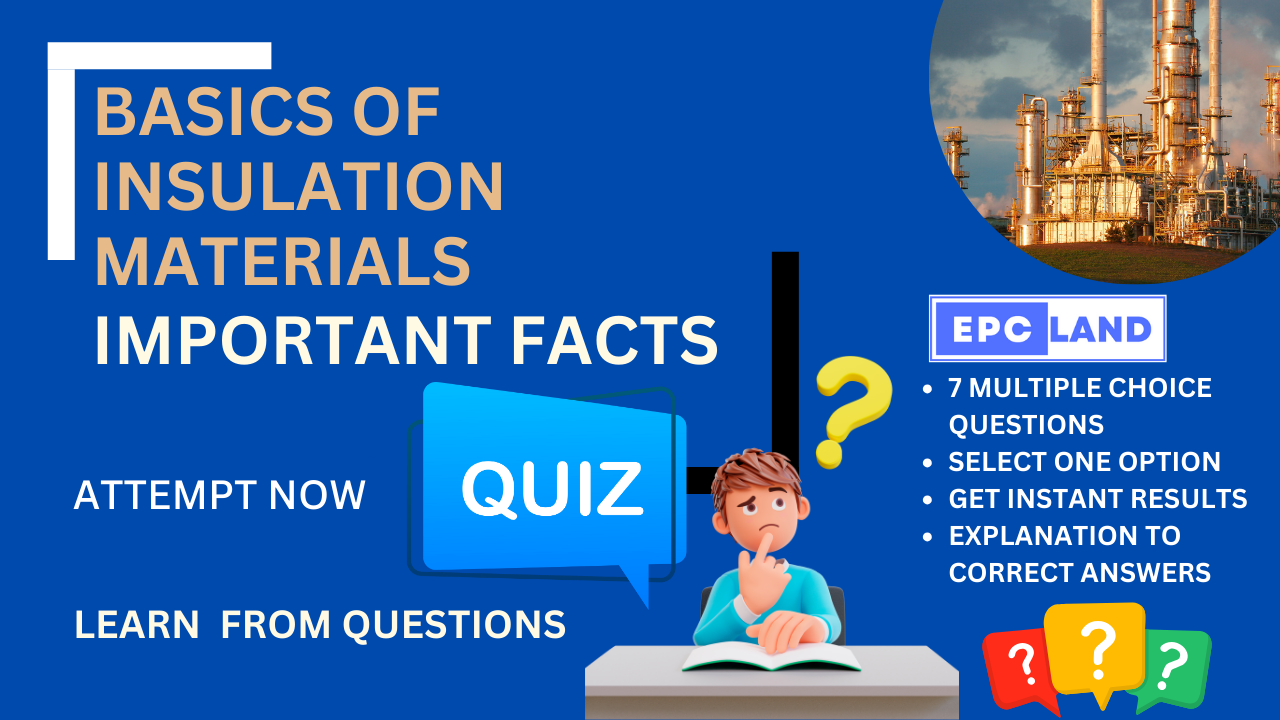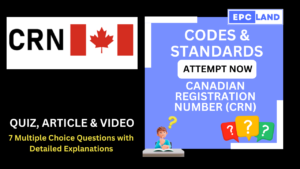1. What is the temperature range of Thermocol (Expanded Polystyrene) as an organic insulation material?
Explanation: The correct answer is A) -40°C to +80°C. Thermocol is suitable for cold insulation for piping and cold storage construction.
2. What is the density range of Poly Urethane Foam (PUF) as an organic insulation material?
Explanation: The correct answer is B) 30-60 kg/m³. Poly Urethane Foam (PUF) is used for thermal insulation for walls, roofs, and appliances.
3. Which organic insulation material is susceptible to degradation from moisture and ultraviolet radiation?
Explanation: The correct answer is A) Thermocol (Expanded Polystyrene). It can be susceptible to degradation from moisture and ultraviolet radiation.
4. What is the temperature range of Expanded nitrile rubber as an organic insulation material?
Explanation: The correct answer is A) -40°C to +80°C. Expanded nitrile rubber is used for ducting insulation in air conditioning and refrigeration pipework.
5. What is the density range of Rock mineral wool as an organic insulation material?
Explanation: The correct answer is D) 64-128 kg/m³. Rock mineral wool is used for thermal insulation in walls, roofs, and industrial applications.
6. What is the thermal conductivity of Calcium Silicate at 200°C?
Explanation: The correct answer is C) 0.07 W/m·K. Calcium Silicate is suitable for industrial process plant piping where high service temperature and compressive strength are needed.
7. What is the primary factor to consider when choosing insulation material for those concerned about sustainability?
Explanation: The correct answer is D) The environmental impact. Consideration for sustainability involves evaluating the environmental impact of the insulation material.
Short Article on Insulation Materials
Insulation Materials
Organic insulation
Organic insulation materials are derived from hydrocarbon polymers and are typically lightweight, flexible, and easy to install. They offer good thermal insulation properties and are generally less expensive than inorganic insulation materials. However, organic insulation materials are also more flammable and can be susceptible to degradation from moisture and ultraviolet radiation.
- Thermocol (Expanded Polystyrene):
- Temperature range: -40°C to +80°C
- Thermal conductivity: 0.029 W/m·K
- Density: 15-30 kg/m³
- Applications: Cold insulation for piping and cold storage construction, packaging
- Poly Urethane Form (PUF):
- Temperature range: -40°C to +120°C
- Thermal conductivity: 0.020 W/m·K
- Density: 30-60 kg/m³
- Applications: Thermal insulation for walls, roofs, and appliances, spray foam insulation
Inorganic insulation
Inorganic insulation materials are derived from mineral or synthetic fibers and are typically more durable and fire-resistant than organic insulation materials. They offer good thermal insulation properties and are less susceptible to degradation from moisture and ultraviolet radiation. However, inorganic insulation materials are also generally more expensive and heavier than organic insulation materials.
- Calcium Silicate:
- Temperature range: 40°C to 950°C
- Thermal conductivity: 0.07 W/m·K (at 200°C)
- Density: 260 kg/m³
- Applications: Industrial process plant piping where high service temperature and compressive strength are needed
- Mineral wool:
- Temperature range: -10°C to 500°C
- Thermal conductivity: 0.039 W/m·K
- Density: 48-144 kg/m³
- Applications: Thermal and acoustic insulation for heating and chilling system pipelines, fireproofing
- Expanded nitrile rubber:
- Temperature range: -40°C to +80°C
- Thermal conductivity: 0.035 W/m·K
- Density: 150-250 kg/m³
- Applications: Ducting insulation for air conditioning, condensation control in refrigeration pipework
- Rock mineral wool:
- Temperature range: -40°C to 800°C
- Thermal conductivity: 0.039 W/m·K
- Density: 64-128 kg/m³
- Applications: Thermal insulation for walls, roofs, and industrial applications, fireproofing
Other factors to consider when choosing insulation material:
- The R-value of the insulation material, which is a measure of its thermal resistance. The higher the R-value, the better the insulation.
- The fire resistance of the insulation material, which is important for applications where fire safety is a concern.
- The moisture resistance of the insulation material, which is important for applications where moisture is a concern.
- The environmental impact of the insulation material, which is important for those who are concerned about sustainability.
Thermal Conductivities (Hot Insulation):
| Mean Temperature (°C) | Calcium Silicate | Resin Bonded Mineral Wool | Ceramic Fiber Blankets |
|---|---|---|---|
| 100 | – | 0.04 | – |
| 200 | 0.07 | 0.06 | 0.06 |
| 300 | 0.08 | 0.08 | 0.07 |
| 400 | 0.08 | 0.11 | 0.09 |
| 700 | – | – | 0.17 |
| 1000 | – | – | 0.26 |
Specific Thermal Conductivity of Materials (Cold Insulation):
| Materials | Thermal Conductivity (W/m-°C) |
|---|---|
| Mineral or Glass Fiber Blanket Board | 0.039 |
| Cellular Glass | 0.058 |
| Cork Board | 0.043 |
| Glass Fiber | 0.036 |
| Expanded Polystyrene (Smooth) | 0.029 |
| Expanded Polystyrene (Cut Cell) | 0.036 |
| Expanded Polyurethane | 0.017 |
| Phenotherm (Trade Name) | 0.018 |
| Loose Fill | |
| – Paper or Wood Pulp | 0.039 |
| – Sawdust or Shavings | 0.065 |
| Minerals Wool (Rock, Glass, Slag) | 0.039 |
| Wood Fiber (Soft) | 0.043 |
Additional Information:
- Specific heat (kJ/kg/°C) at different temperatures.
- Service temperature and density for each material.
Table of Contents
Don’t miss the Course on Effective Isometrics Management: Check Now
Enrollment Link
Recommended courses (Published on EPCLand)
- Complete Course on Piping Engineering
- Basics of Piping Engineering
- Piping Layout Engineering
- Piping Material Engineering
- Piping Stress Analysis
- Material Requisitions
- Piping Material Specifications
- Valve Material Specifications
- Plant Design & Layouts-OISD 118
- Isometric Management
Library of Technical Articles
Don’t miss out the collection of 15+ articles on following topics:
- Basics of Oil and Gas Industry
- Valves
- Testing
- Tank
- Piping Bulk Items
- Pipe
- Metallurgy
- Piping Materials
- Layout
- Instrumentation
- Heat Exchanger
- Type of Contracts
- Codes and Standards
- ASTM Standards
- Articles on Piping Specialty Items
Video details of Complete Course on Piping Engineering
Why Enroll in the EPCLand
Proven Track Record– PTR
Activities & Achievements before launching EPCLand
- Published more than 50+ short courses
- 3000+ Enrolments
- More than 3,500,00 Minutes of watch hours in the last 2 years
- 4000+ Students in 100+ Countries
- Rating of 4+ out of 5
- 1000+ YouTube Videos
- 8K+ Subscribers
What Students will Learn
- Codes & Standards of the Energy Sector
- Piping Material Engineering
- Piping Layout Engineering
- Stress Analysis
Interesting facts
- All the published courses have been developed by Industry Experts with more than 2 decades of experience
- Content is based on Practical experience and real-time problems.
- Content is designed and organized in such a manner that it can be easily grabbed.
- Complete website, Blogs and Quiz sections are Planned, Designed and published by myself (About me: Atul Singla)
- Complete flexibility of Time & Location, Students can access the content from anywhere & anytime
- Moreover, once enrolled, the content can be access as many times as you want, which helps in understand the fundamentals in a better way.
Conclusion
In conclusion, our courses are meticulously crafted by industry experts with over two decades of hands-on experience. The content is rooted in practical knowledge, addressing real-time problems. The material is thoughtfully designed and organized for easy comprehension. Every aspect, from the website to blogs and quizzes, has been planned, designed, and executed by Atul Singla, ensuring a comprehensive and seamless learning experience. With the flexibility of accessing the content at any time and from any location, students have the freedom to learn on their terms. Furthermore, enrollment grants unlimited access, allowing learners to revisit the material as often as needed, fostering a deep understanding of the fundamentals.



